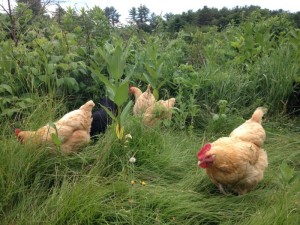 Pastured eggs contain more nutrients
Pastured eggs contain more nutrients
Hens allowed to roam free in grassy pastures filled with weeds and wildflowers have access to an extensive range of nutrients. Numerous insects, worms and beetles thrive in green meadows. Thus, in addition to the valuable plant materials available to the hens, they can also feed on mini-beasts which are naturally rich sources of protein, vitamins, enzymes and minerals.
Pastured eggs are lower in stress hormones
Caged hens are constantly under stress. Some become so distraught and anxious due to their imprisonment that they pluck out their own feathers. The ‘stress hormone’ cortisol has been linked with obesity, decreased immune function and osteoporosis. The low levels of stress in free-roaming, contented hens means fewer stress hormones – such as cortisol – pass into the eggs and thence into our bodies.
Pastured eggs are better for you
A study looking at the Vitamins A, E and fatty acid composition of the eggs of caged hens and pastured hens found that:
‘Compared to eggs of the caged hens, pastured hens’ eggs had twice as much vitamin E and long-chain omega-3 fats, 2.5-fold more total omega-3 fatty acids, and less than half the ratio of omega-6:omega-3 fatty acids (P<0.0001). Vitamin A concentration was 38% higher (P<0.05) in the pastured hens’ eggs than in the caged hens’ eggs…’
This is why pastured eggs are better for you!
H.D. Karsten, P.H. Patterson, R. Stout and G. Crews,
Renewable Agriculture and Food Systems / Volume 25 / Special Issue 01 / March 2010, pp 45-54
Copyright © Cambridge University Press 2010
DOI: http://dx.doi.org/10.1017/S1742170509990214,
Published online: 12 January 2010

 Pastured eggs contain more nutrients
Pastured eggs contain more nutrients